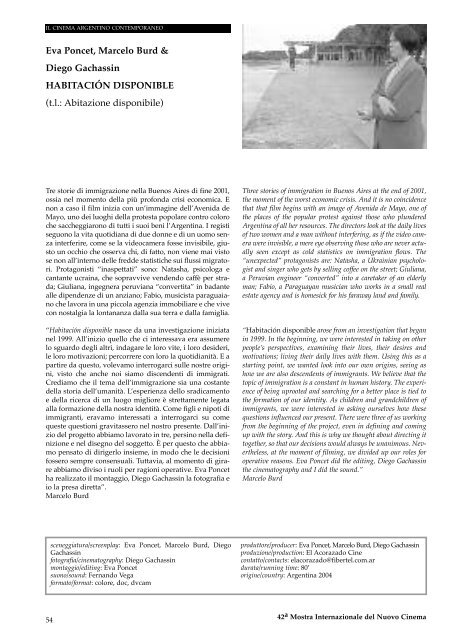Catalogo - Mostra internazionale del nuovo cinema
Catalogo - Mostra internazionale del nuovo cinema
Catalogo - Mostra internazionale del nuovo cinema
You also want an ePaper? Increase the reach of your titles
YUMPU automatically turns print PDFs into web optimized ePapers that Google loves.
IL CINEMA ARGENTINO CONTEMPORANEO<br />
Eva Poncet, Marcelo Burd &<br />
Diego Gachassin<br />
HABITACIÓN DISPONIBLE<br />
(t.l.: Abitazione disponibile)<br />
Tre storie di immigrazione nella Buenos Aires di fine 2001,<br />
ossia nel momento <strong>del</strong>la più profonda crisi economica. E<br />
non a caso il film inizia con un’immagine <strong>del</strong>l’Avenida de<br />
Mayo, uno dei luoghi <strong>del</strong>la protesta popolare contro coloro<br />
che saccheggiarono di tutti i suoi beni l’Argentina. I registi<br />
seguono la vita quotidiana di due donne e di un uomo senza<br />
interferire, come se la videocamera fosse invisibile, giusto<br />
un occhio che osserva chi, di fatto, non viene mai visto<br />
se non all’interno <strong>del</strong>le fredde statistiche sui flussi migratori.<br />
Protagonisti “inaspettati” sono: Natasha, psicologa e<br />
cantante ucraina, che sopravvive vendendo caffè per strada;<br />
Giuliana, ingegnera peruviana “convertita” in badante<br />
alle dipendenze di un anziano; Fabio, musicista paraguaiano<br />
che lavora in una piccola agenzia immobiliare e che vive<br />
con nostalgia la lontananza dalla sua terra e dalla famiglia.<br />
“Habitación disponible nasce da una investigazione iniziata<br />
nel 1999. All’inizio quello che ci interessava era assumere<br />
lo sguardo degli altri, indagare le loro vite, i loro desideri,<br />
le loro motivazioni; percorrere con loro la quotidianità. E a<br />
partire da questo, volevamo interrogarci sulle nostre origini,<br />
visto che anche noi siamo discendenti di immigrati.<br />
Crediamo che il tema <strong>del</strong>l’immigrazione sia una costante<br />
<strong>del</strong>la storia <strong>del</strong>l’umanità. L’esperienza <strong>del</strong>lo sradicamento<br />
e <strong>del</strong>la ricerca di un luogo migliore è strettamente legata<br />
alla formazione <strong>del</strong>la nostra identità. Come figli e nipoti di<br />
immigranti, eravamo interessati a interrogarci su come<br />
queste questioni gravitassero nel nostro presente. Dall’inizio<br />
<strong>del</strong> progetto abbiamo lavorato in tre, persino nella definizione<br />
e nel disegno <strong>del</strong> soggetto. È per questo che abbiamo<br />
pensato di dirigerlo insieme, in modo che le decisioni<br />
fossero sempre consensuali. Tuttavia, al momento di girare<br />
abbiamo diviso i ruoli per ragioni operative. Eva Poncet<br />
ha realizzato il montaggio, Diego Gachassin la fotografia e<br />
io la presa diretta”.<br />
Marcelo Burd<br />
sceneggiatura/screenplay: Eva Poncet, Marcelo Burd, Diego<br />
Gachassin<br />
fotografia/<strong>cinema</strong>tography: Diego Gachassin<br />
montaggio/editing: Eva Poncet<br />
suono/sound: Fernando Vega<br />
formato/format: colore, doc, dvcam<br />
54<br />
Three stories of immigration in Buenos Aires at the end of 2001,<br />
the moment of the worst economic crisis. And it is no coincidence<br />
that that film begins with an image of Avenida de Mayo, one of<br />
the places of the popular protest against those who plundered<br />
Argentina of all her resources. The directors look at the daily lives<br />
of two women and a man without interfering, as if the video camera<br />
were invisible, a mere eye observing those who are never actually<br />
seen except as cold statistics on immigration flows. The<br />
“unexpected” protagonists are: Natasha, a Ukrainian psychologist<br />
and singer who gets by selling coffee on the street; Giuliana,<br />
a Peruvian engineer “converted” into a caretaker of an elderly<br />
man; Fabio, a Paraguayan musician who works in a small real<br />
estate agency and is homesick for his faraway land and family.<br />
“Habitación disponible arose from an investigation that began<br />
in 1999. In the beginning, we were interested in taking on other<br />
people’s perspectives, examining their lives, their desires and<br />
motivations; living their daily lives with them. Using this as a<br />
starting point, we wanted look into our own origins, seeing as<br />
how we are also descendents of immigrants. We believe that the<br />
topic of immigration is a constant in human history. The experience<br />
of being uprooted and searching for a better place is tied to<br />
the formation of our identity. As children and grandchildren of<br />
immigrants, we were interested in asking ourselves how these<br />
questions influenced our present. There were three of us working<br />
from the beginning of the project, even in defining and coming<br />
up with the story. And this is why we thought about directing it<br />
together, so that our decisions would always be unanimous. Nevertheless,<br />
at the moment of filming, we divided up our roles for<br />
operative reasons. Eva Poncet did the editing, Diego Gachassin<br />
the <strong>cinema</strong>tography and I did the sound.”<br />
Marcelo Burd<br />
produttore/producer: Eva Poncet, Marcelo Burd, Diego Gachassin<br />
produzione/production: El Acorazado Cine<br />
contatto/contacts: elacorazado@fibertel.com.ar<br />
durata/running time: 80’<br />
origine/country: Argentina 2004<br />
42 a <strong>Mostra</strong> Internazionale <strong>del</strong> Nuovo Cinema

















